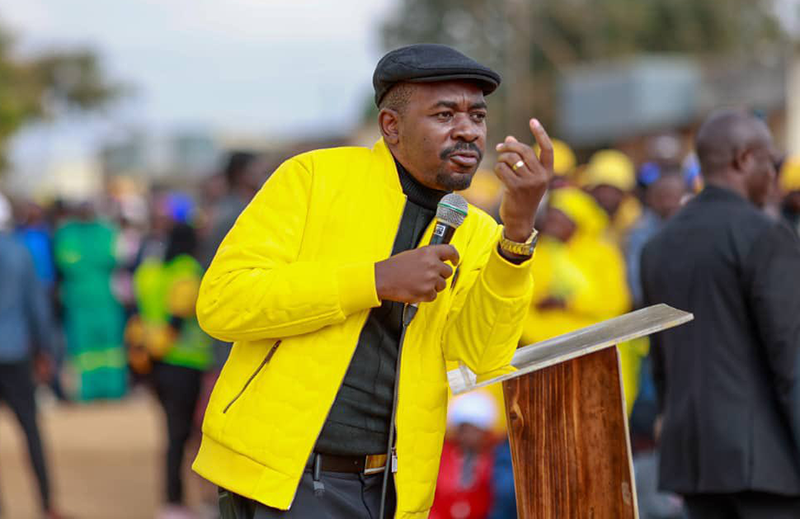- Featured
- No Comment
Chamisa appeals to Speaker over recalls as his CCC ‘disengages’ from parliament

By News 24
CCC leader and losing presidential candidate, Nelson Chamisa, says his party will “disengage” from lawmaking amid an implosion within the party in a sequence of events that has now included riot police.
“Until this issue is resolved, CCC MPs and councillors will disengage from parliament and councils. When we say disengage, we do not mean that they have withdrawn.
“We are saying no business will be transacted until remedy and justice are done through a mechanism we have agreed,” he said.
But total withdrawal is on the cards, he warned and also wrote to the Speaker asking him to reverse the recalls insisting they were done in error and based on communication from an unauthorised individual.
Implosion
This week, CCC secretary-general Sengezo Tshabangu recalled 15 legislators from parliament.
Tshabangu said he was recalling lawmakers that were imposed ahead of the 23 August elections after failing to get popular support from the party’s primary selection process.
CCC leaders claimed that Tshabangu was working with the ruling Zanu PF, but its acting director for information and publicity, Farai Marapira, said that was not true.
READ | Zimbabwe’s main opposition implodes as renegade recalls lawmakers, handing Zanu PF full control
Chamisa insisted to journalists that “Zanu PF is using certain people purporting to be CCC, who are not even in our books in terms of membership registry.”
Legislators also shared Chamisa’s convictions.
On Tuesday, in parliament, they protested against the recalls.
Riot police were summoned to deal with unruly legislators for what Chamisa called “cowardly” behaviour.
In reaction to the chaotic scenes, speaker of parliament, Jacob Mudenda, suspended all CCC legislators for two weeks and also docked their two-month salaries and benefits.
This was the second time in the space of a month for Mudenda to sanction them. The first time was when the CCC legislators absconded from the opening of parliament address by President Emmerson Mnangagwa.
What next for CCC?
Chamisa said the party would “disengage” all party legislators and councillors from both parliament and councils because of the recall of the 15 legislators.
He threatened that if the recalls continued, total withdrawal from parliament was an option.
He said:
We have disengaged, but withdrawal is also on the cards. We already have a constitutional crisis, but there is going to be a worse one if there is no justice on the issues that are at play.
Fighting on two fronts
Chamisa is now tasked with holding his party together, failing which Zanu PF will gain more than a two-thirds majority in parliament.
In the history of Zimbabwean politics, the failure of the opposition to be part of critical lawmaking and electoral reforms has come back to bite them during general elections, which are largely disputed with the ruling party accused of lawfare.
Since the 23 August election, the CCC has voiced concern that the elections were flawed and went on a regional offensive, trying to push for Zimbabwe to be brought before the SADC Organ on Politics, Defence, and Security.
On the basis of the SADC Election Observer Mission (SEOM) report on the Zimbabwe elections, there seemed to be leverage.
Stephen Chan is a professor of world politics at the School of Oriental and African Studies (SOAS), University of London, and an avid follower of Zimbabwean politics.
As one of the people who has in the past fought on the side of Chamisa, he finds the “disengagement” strategy confusing in that it might also affect his regional offensive.
He said:
It’s getting confusing now: calling for dialogue while disengaging from the elected positions that remain, saying Zanu PF is responsible but still wanting dialogue.
“If Chamisa appeals to the regional leaders, they will say, Yes, it is reasonable to see the hand of Zanu PF behind all this. But how did you fall into all these traps they set for you? The regional leaders will ask questions about foresight, strategy, and leadership. Basically,” he said in a series of posts on X (formerly Twitter).
Chamisa told journalists at a press conference in Harare on Wednesday that the way forward for Zimbabwe was dialogue.
“There has to be a political settlement, a political dialogue immediately, to be able to deal with the issues of the disputed election, and it is in this spirit mandated by the citizens and the national assembly,” he said.
